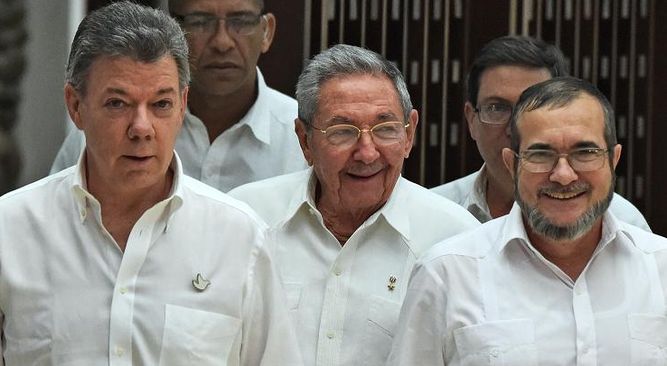
 Cubanet, Miriam Celaya, Havana, 27 April 2018 — Long before what the most skeptical anticipated, the failure of the new “Peace Accords” between the Colombian government and the former Revolutionary Armed Forces of Colombia (FARC) – today metamorphosed into a political party today – is a real possibility on the horizon of that South American nation.
Cubanet, Miriam Celaya, Havana, 27 April 2018 — Long before what the most skeptical anticipated, the failure of the new “Peace Accords” between the Colombian government and the former Revolutionary Armed Forces of Colombia (FARC) – today metamorphosed into a political party today – is a real possibility on the horizon of that South American nation.
The pacts were negotiated in Havana for four years before being signed in Colombia, with much fanfare, on September 26, 2016. A plebiscite held on October 2 of the same year received a resounding NO, but after making several modifications to the initial version, the pact was finally signed at the Colón theater in Bogotá. From the moment of its first steps, the pact has been on shaky ground, and it is now on the verge of tumbling.
The recent imprisonment of former FARC guerrilla leader Jesús Santrich, accused of having links to drug trafficking, and his possible extradition to the United States – a situation that, as the high commissioner for the Peace of Colombia has declared, should be clarified judicially and not through debates between the government and political actors – deepens the doubts about the seriousness and veracity of the commitment of the leaders of the now called Common Alternative Revolutionary Force (FARC) to leave behind a past of violence and war that marked half a century of national Colombian life.
However, this episode is just another nail in the coffin of a handful of Agreements that evidently lacked the broad popular support that was attributed to them from the beginning, as demonstrated by the results of the October 2016 plebiscite, and more recently, with the popular rejection that the FARC leader received in his political campaign tour related to the presidential elections, from which he chose to withdraw.
On the other hand, public opinion is not greatly surprised by the arrest and incarceration of Mr. Santrich. It was an open secret that, after losing the financial and logistical support of the former Soviet Union, the Marxist fighters of the Colombian jungles, once champions of the cause of the poor, had rapidly evolved into narco-guerrillas.
The trafficking of cocaine and the extraction of gold which, it is claimed, were always part of the fighters’ “self-financing”, thus became essential sources for the economic and material support of the war and, at its core, for the enrichment of the members of its power elite.
It is not surprising, then, that after the signing of the Havana Peace Accords, the FARC leaders – far from looking like the leaders of an army made up of peasants, workers and other poor and “oppressed” sectors of society – in truth were transformed into administrators of goods and assets of about $345 million, according to an estimate from a list delivered to the Government of Juan Manuel Santos by the UN Mission in Colombia in August of 2017.
However, it is baffling (at the very least) that instead of the gang of the needy one would expect from those who, in theory, have suffered the privations of war and jungle, the harshness of fighting and the persecution of the army, the cream of the crop of the former guerrilla force are in a position to fulfill the obligation to have gold, money, land, livestock, means of transportation and other assets to pay to the fund for reparations to the victims of the armed conflict, as settled in the Agreements.
In this way, due to these difficult paradoxes of reality, the fruits of systematic crime, kidnapping, extortion and terror which was planted in Colombian society for decades, is today part of the safe-conduct for impunity that, though not necessarily forced or required, leaves a bitter taste on the mouths of the victims.
That is why it is even the more brazen that the cynicism with which the FARC – and here I refer to the “political party” – pretends to pose as a victim of political persecution, when one of the members of its clique has been caught in flagrante delicto of drug trafficking, according to the Colombian authorities, breaking with what was agreed in the Peace negotiations.
These days, his colleagues in arms and misdeeds affirm that poor Santrich is in his 15th day of a hunger strike, which “has begun to wreak havoc on his health” and one we hope he is determined to continue to its ultimate consequences.
Since the accused does not have the one act-farce style, so often used by the regional left when defeat circles its wagons, this angelic image that’s being offered of a poor, unjustly incarcerated blind man (and two other companions (cronies?) locked up in the same prison), who is willing to sacrifice his life to prove his innocence, denied the assistance of his own doctors by the authorities, is almost tender. It would seem that those kidnapped and murdered until recently by FARC guerrillas had received a lot better treatment and considerations.
But perhaps such a plaintive stance only tries to mask, as far as possible, the ramifications that drug trafficking reaches among that dark amalgam of Marxist-drug-traffickers-guerrillas-politicians, for whom perhaps the failed Peace Accords – not coincidentally negotiated in Havana’s Palace of the Revolution by their historical allies, the Castros – are too much like a capitulation of their olive-green glory days, when they camped at will, kidnapping, extorting, trafficking and murdering in the jungles and towns of Colombia.
Translated by Norma Whiting
